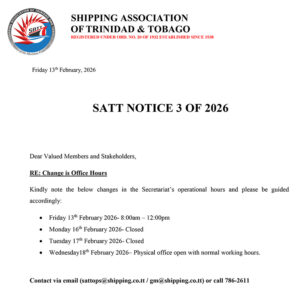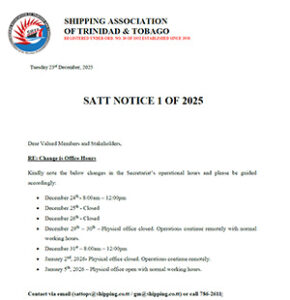Gail Alexander
Senior Political Reporter
Government will explore “every available option” to address the impact of the United States’ new 15 per cent tariff on T&T exports, including diplomatic talks with Washington, says Finance Minister Dave Tancoo.
He made the comment yesterday, ahead of today’s first meeting of an inter-ministerial team tasked with assessing the tariff’s impact and formulating solutions.
Prime Minister Kamla Persad-Bissessar last Thursday called for a review of the matter, warning of potential economic fallout from reduced competitiveness, lower foreign exchange inflows, and challenges for the manufacturing and energy sectors.
“Obviously, this will make our products less competitive on the US market and will have a knock-on effect on exports, especially ammonia, methanol, and manufactured goods,” Tancoo told Guardian Media.
“This challenge, however, provides us with additional impetus to look for more markets for our products. Government will explore every option available, including diplomatic initiatives and talks with the US,” he added, noting that the ministries of Trade, Finance, Energy, Foreign Affairs, and Agriculture all have roles to play.
Confederation of Regional Business Chambers (CRBC) chairman Vivek Charran also warned of possible knock-on effects on imports, particularly US-branded goods such as cell phones, clothing and footwear manufactured in high-tariff countries like China, India, Canada and Brazil.
He said while the tariff may not directly affect imports into T&T from those countries, products routed through US distributors could see price hikes once current stocks run out.
“One of the biggest problems with the US tariff is that the US is a large exporter of products it doesn’t make—goods manufactured in China, India, Bangladesh, or elsewhere. For example, Apple phones are made in China,” Charran said
“Household appliances, furniture, and other goods sourced from high-tariff countries could also face price increases.”
Charran said importers have options, such as bypassing US distributors and sourcing directly from manufacturers in China, Japan, the Middle East, or South America.
“For example, Samsung fridges in Panama are bought directly from Japan and don’t pass through the US, so they’re cheaper,” he noted.
However, some large importers are contractually bound to buy from US-based distributors serving the Caribbean market.
In such cases, Charran suggested sourcing goods entirely made in the US—though he warned this could pose risks, given the region’s heavy reliance on US food imports.
He said the situation highlights the need for accelerated diversification, particularly in light manufacturing, including furniture production.
Source: guardian.co.tt







